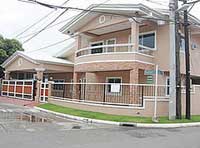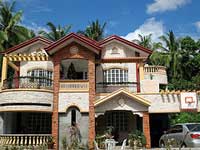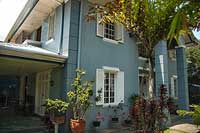Inheritance tax and inheritance law in Philippines
The Global Property Guide looks at inheritance from two angles: taxation, and what inheritance laws apply to foreigners leaving property in Philippines: what restrictions there are and whether making a will is advisable.
INHERITANCE TAX
How high are inheritance taxes in Philippines?
ESTATE TAX
Nonresident foreigners pay estate tax only on property located in the Philippines. The taxable inheritance is arrived at after deducting all expenses, losses, debts, and taxes related to the property (all proportionate to the ratio of the Philippine gross estate to his total estate) as well as the surviving spouse´s net share. Estate tax is levied at progressive rates.
ESTATE TAX |
|
| TAX BASE, PHP (US$) | TAX RATE |
| Up to 200,000 (US$4,000) | 0% |
| 200,000 - 500,000 (US$10,000) | 5% on band over US$4,000 |
| 500,000 - 2 million (US$40,000) | 8% on band over US$10,000 |
| 2 million - 5 million (US$100,000) | 11% on band over US$40,000 |
| 5 million - 10 million (US$212,766) | 15% on band over US$100,000 |
| Over 10 million (US$200,000) | 20% on band over US$200,000 |
| Source: Global Property Guide | |
Citizens and Resident Foreigners
Citizens and resident foreigners are allowed the following deductions, aside from the expenses and taxes related to the property as well as the surviving spouse´s share, before arriving at the taxable estate:
- PHP1 million (US$20,000) standard deduction,
- PHP1 million (US$20,000) for the family home,
- PHP200,000 (US$4,000) for funeral expenses, and
- PHP500,000 (US$10,000) for medical expenses during one whole year before the
DONOR´S TAX
Nonresident foreigners pay donor´s tax when they donate real property located in the Philippines. Donor´s tax is generally levied at progressive rates.
DONOR´S TAX |
|
| TAX BASE, PHP (US$) | TAX RATE |
| Up to 100,000 (US$2,000) | 0% |
| 100,000 - 200,000 (US$4,000) | 2% on band over US$2,000 |
| 200,000 - 500,000 (US$10,000) | 4% on band over US$4,000 |
| 500,000 - 1 million (US$20,000) | 6% on band over US$10,000 |
| 1 million - 3 million (US$60,000) | 8% on band over US$20,000 |
| 3 million - 5 million (US$100,000) | 10% on band over US$60,000 |
| 5 million - 10 million (US$200,000) | 12% on band over US$100,000 |
| Over 10 million (US$200,000) | 15% on all value over US$200,000 |
| Source: Global Property Guide | |
However, if the recipient of the donation is considered a ´stranger´ for tax purposes, then donor´s tax is levied at a flat rate of 30%. A stranger is a person who is not a brother, sister, spouse, ancestor, lineal descendant, or a relative by consanguinity in the collateral line within the fourth degree of relationship.
INHERITANCE LAW
Thanks to Platon Martinez Flores San Pedro Leaño Law Offices
What inheritance laws apply in Philippines?

The law of the foreigner´s nationality governs inheritance in the Philippines.
Philippine inheritance law is governed by the Civil Code of the Philippines, with the Rules of Court completing the procedural framework.
The general principle in the Philippines is that substantive issues of inheritance, such as the order of succession, amounts of successional rights, validity of testamentary dispositions, capacity to inherit, absence of a will, compulsory heirs, and reserved and free portions are primarily assessed according to the national laws (or, in certain cases, domiciliary laws) of deceased foreigners. The national or domiciliary laws of the deceased foreigner apply regardless of the nature or location of the property in question.
It is possible that the inheritance issues of some foreigners who own property in the Philippines might become subject to renvoi (i.e. the issues are referred back to the Philippines). Situations in which renvoi may be anticipated include:
- If the property in question is located in the Philippines, and the foreigner´s national law states that the applicable legislation for inheritance issues is the law of the country where the property is located (lex situs).
- If the foreigner´s national law states that the applicable legislation is that of the foreigner´s domicile, and the domicile of the foreigner, as defined by his/her national law, is the Philippines.
- If the foreigner´s national or domiciliary laws refer inheritance issues back to the Philippines, even though the Philippines is not the foreigner´s domicile or country of residence.
In the above cases, the Philippines legal system, as ruled by the Supreme Court, has no alternative but to accept the renvoi, and apply the Philippines Civil Code, thereby avoiding conflicts with the national or domiciliary laws of the deceased foreigner.
The court dealing with inheritance issues depends on the value of the estate.
If the gross value exceeds Php200,000 (about US$4,000) or Php400,000 (about US$8,000) in Metro Manila, then the Regional Trial Court has exclusive original jurisdiction. If the gross value is less than the above amounts, then the Metropolitan Trial Court, Municipal Trial Court or Municipal Trial Circuit Court has jurisdiction. The Rules of Court (specifically the Rules on Settlement of Estate of Deceased Persons) govern the procedures to be followed.
Alternatively, under the Rules of Court, an estate may be devolved through extrajudicial settlement, by mutual agreement among the heirs. This method requires that the deceased left no will and no debts, and that all the heirs are of legal age (although minors can be represented by judicial or legal representatives). The heirs simply divide the estate among themselves as they see fit, by means of a public instrument, and this document is thereafter filed with the Philippine Register of Deeds. A sole heir may adjudicate to him/herself an entire estate by means of an affidavit filed in the Philippine Register of Deeds.
Depending on the size of the estate, the intricacy of the issues, and the parties involved, court proceedings for the settlement of estates in Philippines can run for a minimum period of six months to a maximum of several years.
Philippine law stipulates a reserved portion for compulsory heirs
Certain parts of the estate of a deceased Filipino citizen cannot be freely disposed of because Philippines law reserves them for the "compulsory heirs". The same reservation does not necessarily apply to foreigners who are governed by their national inheritance laws. However if the Philippines court accepts a renvoi, then the reserved portions, "reserves" or "legitimes" established in Philippine law become applicable to foreigners.
The "compulsory heirs" are classified as:
- Primary - legitimate children and/or descendants
- Secondary - legitimate parents and/or ascendants; illegitimate parents
- Concurring - surviving spouse; illegitimate children and/or descendants
"Primary compulsory heirs" are preferred over secondary heirs, who receive only in default of the primary. "Concurring compulsory heirs" generally succeed as compulsory heirs, together with primary or secondary heirs.
Depending on the surviving heirs called to the succession, the law reserves at least one half of the deceased´s hereditary estate for distribution to the heirs. The hereditary estate is the difference between the assets and the liabilities of the deceased. If a property is conjugally-owned by spouses, or co-owned by several parties, then only that portion of the property belonging to the deceased forms part of the hereditary estate.
The Philippine Civil Code regarding "reserves" or "legitimes" provides that
- One legitimate child is entitled to ½ of the hereditary estate. Two or more legitimate children are entitled to distribute ½ of the hereditary estate equally among themselves.
- The surviving spouse is entitled to ¼ of the hereditary estate if there is only one legitimate child. With 2 or more legitimate children, the surviving spouse is entitled to a portion equal to the legitime of a legitimate child. The legitime of the surviving spouse is taken from the free portion of the hereditary estate.
- The legitime of illegitimate children are taken from the free portion of the hereditary estate, provided that they do not exceed the free portion. The Family Code of the Philippines provides that the legitime of each illegitimate child consists of ½ of that of a legitimate child.
- In the absence of legitimate children and descendants, the legitime of legitimate parents or ascendants consists of ½ of the hereditary estate of their children and descendants. The testator may freely dispose of the other half, subject to the rights of illegitimate children and the surviving spouse.
For example, if a decedent is survived by his wife and four legitimate children, ½ of his hereditary estate is reserved equally between the children (1/8 each) whilst the wife takes the same share as one legitimate child i.e. 1/8. This leaves 3/8 of the estate which can be freely disposed of in accordance with his will.
The free portion of a hereditary estate can be freely willed to any person or class of person with the capacity to succeed under the Civil Code, even if that person is already a compulsory heir, with a prescribed legitime.
There may be instances where no free portion is left to distribute. For example, if there is one legitimate child, a surviving spouse and two illegitimate children, the legitimate child gets ½ of the hereditary estate, the surviving spouse gets ¼ and the two legitimate children share equally the remaining ¼ portion, so there is no free portion.

Foreign wills are allowed in the Philippines
The will of a foreigner that is proven and allowed in a foreign country, in accordance with the laws of that country, may be allowed, filed and recorded by the Philippine courts. A copy of the will and the decree of allowance issued by the proper authorities in the foreign country, must be duly authenticated, and filed with a petition for allowance before the Philippine courts. The due execution of the will and the testamentary capacity of the decedent need not be proven again. After hearing, the Philippine court decides whether the will may be allowed in the Philippines.
Foreigners can make a local will
High income or upper middle class Filipinos are most likely to make a will, but those in the low income classes are unlikely to do so. Executing a will requires the heirs to go through the tedious process of probate proceedings, and rules out extrajudicial settlement of the estate. In some instances, as a form of estate planning, families establish "close corporations" or "holding companies" to hold and manage properties of the family to ensure continued development and expansion of family properties without being bogged down by succession or estate issues.
If a foreigner decides to make a notarial will in the Philippines, his/her presence in the Philippines is required. The prerequisite formalities for a notarial will are:
- The will must be signed at the end thereof by the testator himself;
- It must be attested to by three or more credible witnesses in the presence of the testator and of each other;
- Each and every page except the last must be signed on the left margin by the testator and his witnesses in the presence of each other;
- Each and every page of the will must be numbered correlatively in letters placed on the upper part of each page;
- It must contain an attestation clause (in a specified form) and signed by the witnesses; and,
- It must be acknowledged before a notary public by the testator and the witnesses.
In the case of a holographic will, Philippine law only requires that it is entirely handwritten, signed and dated by the maker.
Private land in Philippines cannot be bequeathed to a foreigner.
If a foreign decedent owns private land in the Philippines, then current Philippine law considers as void any provision in the foreigner´s will bequeathing the land to another foreigner. This is due to the Philippine law which limits ownership of private land in the Philippines to the following:
- Filipino citizens;
- Corporations or associations - at least 60% of the capital must be owned by Filipino citizens;
- Natural-born Filipino citizens who have lost their Philippine citizenship, subject to certain limitations;
- Non-Filipino citizens, who can inherit land by hereditary or intestate succession (without a will) but not by testamentary succession (with a will).

Although ownership of private land in the Philippines is currently subject to the above nationality restrictions, foreigners are at liberty to buy condominium units, and most condominium projects in the Philippines are structured so that that foreigners can own such units; consequently condominiums may be inherited by foreigners through testamentary or intestate succession.
There is a possibility that foreign ownership restrictions in the Philippines may be removed in the future if the Constitution is changed, which is the controversial plan of the administration of President Gloria Macapagal-Arroyo.
In the absence of a will, Philippine law designates intestate heirs.
The order of hereditary or intestate succession, if the deceased was a legitimate child, is as follows:
- Legitimate children or descendants;
- Legitimate parents or ascendants;
- Illegitimate children or descendants;
- Surviving spouse;
- Brothers and sisters, nephews and nieces;
- Other collateral relatives within the fifth degree; and,
- The State.
The order of hereditary or intestate succession, if the deceased was an illegitimate child, is as follows:
- Legitimate children or descendants;
- Illegitimate children or descendants;
- Illegitimate parents (other ascendants are excluded);
- Surviving spouse;
- Brothers and sisters, nephews and nieces; and,
- The State.
The surviving spouse and the illegitimate children or descendants of the deceased are considered as "concurring compulsory heirs" and they succeed, as a general rule, together with the primary or secondary heirs.
Gifts during the lifetime of the owner are advances from the inheritance
Philippine law considers all property given during the lifetime of the deceased as advances from his/her estate. Thus, any property which the deceased gave or donated to other persons before death must be returned to his/her estate. This is known as collation. The actual gifts are not brought to collation, but only their value at the time they were given.

The purpose of collation is to estimate the value of the legitime of compulsory heirs and the amount of the free portion. Philippine rules of evidence apply, so that testimonial or documentary proof of the value of each gift must be presented to the court. There is no limit, in time or size, to the gifts considered. Even if the gifts were made before the compulsory heirs were born, they are collated. However, in practice, it is difficult to prove the value of small gifts, and gifts made a long time ago may be forgotten. Normally, collation only includes real estate (i.e. land, buildings, condominium units, apartments) and valuable personal possessions (e.g. jewelry, cars, stocks, shares, club memberships) for which documentary proof or evidence can be presented to the court.
The values of gifts to compulsory heirs are chargeable against (i.e. deducted from) their legitime, except if the donor has expressed that "collation shall not take place" which means that the values of the gifts are deducted from the free portion. Gifts to persons who are not compulsory heirs are always chargeable against the free portion. If the total value of the gifts exceeds the free portion, then they are considered inofficious, in which case, the excess must be returned to the compulsory heirs. The law contemplates the return of property of the same nature, class and quality, as far as possible.
Ownership of real estate in the Philippines is determined by the Torrens title.
One of the cardinal principles in the Philippines is the indefeasibility of the Torrens Title to determine the ownership of real property. The registered owner indicated on the Torrens Title, and the incidents annotated therein, generally defeat any other claim, or claimant, not so registered. The Torrens Title system is quite reliable and has been used effectively to defeat the claims of some unscrupulous Filipinos who attempt to acquire other people´s real estate in the Philippines by means of spurious or fake titles. A foreigner who purchases or inherits real property in the Philippines is therefore strongly advised to avoid such problems by procuring the services of a local lawyer to ensure that his/her name is registered as the legal owner on the Torrens Title.
residential lot, bank financing, foreclosed properties bpi, farm for sale, farm lot for sale, bpi foreclosed properties, lot for sale, house and lot for sale in baguio city, playa laiya, hacienda farm, foreclosed properties, bank foreclosed properties philippines, pahara southwoods, farm for sale philippines, solen residences, farm lots for sale, philrealty, araya park, lot for sale in tagaytay, the lighthouse tali beach, aveia, inheritance law philippines, farm lot, steps in buying house and lot in the philippines, bank financing requirements, bank financing meaning, chateaux de paris, ayala greenfield estates, mango tree residences, aveia alveo, tali beach house for rent, house for sale in baguio city, camella baia, serin east tagaytay, south forbes villas, playa calatagan, land for sale in bulacan, steps in buying land in the philippines, parkway corporate center, ponderosa leisure farms, citadella executive village, villa de toledo, rules on inheritance philippines, house and lot, mirala nuvali, farm land for sale in bulacan, bank foreclosed properties, luscara nuvali, the lighthouse at tali beach, terrazas de punta fuego, tagaytay highlands houses, la presa baguio, sta rosa estates 2, tagaytay highlands house for sale, hotel for sale philippines, tagaytay house and lot for sale, baguio buy and sell, house for rent in baguio, canyon ranch carmona, house for sale baguio city, twin lakes tagaytay price, cambridge village cainta, sta rosa estates, foreclosed properties in quezon city, tali beach house, baguio house for sale, pueblo de oro batangas, farm lot for sale in bulacan, the woodlands, tagaytay highlands, house and lot for sale baguio city, foreclosed properties 2015, the cambridge village, santa rosa estates 2, foreclosed house and lot for sale in quezon city, gran seville, pacific parkplace village, cambridge cainta, house and lot for sale in cavite, lot for sale in malolos bulacan, inheritance law in the philippines, canyon ranch carmona cavite, 500 sqm lot, royale tagaytay estates, orchard farm in the philippines, house for sale in tagaytay, southridge tagaytay, house and lot for sale dasmarinas cavite, house for sale tagaytay, farm for sale in batangas, bpi foreclosed properties philippines, treveia nuvali, bank foreclosed house and lot, ayala alabang house for sale, lot for sale in lipa city, foreclosed lot in quezon city, caritas don bosco school, house for sale baguio, order of succession philippines, baguio house and lot for sale, tagaytay lot for sale, conjugal property inheritance, ra 9653, araya park residences, tagaytay house for sale, bae laguna, the paddington place, treveia, 8 adriatico, willow park homes, playa laiya beach club, cambridge village condominium, cambridge condominium, west wing residences, farm lot for sale in tagaytay, accolade place, sta rosa laguna house and lot for sale, tagaytay homes, foreclosed properties quezon city, ayala greenfield estate, rental law, foreclosed properties philippines, covent garden sta mesa, what is house, house and lot for sale in tagaytay, mallorca villas, ayala greenfield, tali beach resort, ayala greenfields, rent control law philippines, laguna bel air for sale, stonecrest laguna, condo for sale, foreclosed house and lot for sale in paranaque, baguio city house and lot for sale, tagaytay property for sale, foreclosed properties meaning, fruit orchard in the philippines, miriam college logo, farm for sale philippines batangas, rental law philippines 2017, rental law in the philippines for commercial spaces, bakakeng baguio city, list of foreclosed properties in the philippines, golf hills terraces, rent control law for commercial space philippines, foreclosed house and lot in quezon city, lot for sale in baguio city, villa caceres sta rosa laguna, lot for sale in silang cavite, philippine realty, stonecrest san pedro laguna, farm lot for sale in batangas, legal heirs philippine law, batangas lot for sale, lot for sale tagaytay, stonecrest san pedro, foreclosed house and lot in bulacan, farm lot for sale in cavite, bank financing housing loan, ayala southvale village, paddington place shaw, tagaytay highlands lot for sale, private resort in laguna for rent, foreclosed house and lot in cavite, paddington place, cambridge village, 200 sqm house, rent control act philippines, lot for sale batangas, ps bank foreclosed properties, buy and sell baguio, rental law philippines, rental law philippines commercial, villa caceres sta rosa, townhouse for sale makati, holland park southwoods, tali beach batangas, avida woodhill settings, maple grove cavite, mezza residences sta mesa, downpayment or down payment, foreclosed house and lot in las pinas, house and lot for sale in baguio, houses in baguio, sample lease contract for vacant lot philippines, foreclosed property, tagaytay house and lot for sale by owner, baguio houses, batangas farm lot for sale, bpi properties for sale, rental law in the philippines, tali beach nasugbu batangas, lot for sale in batangas, bdo repossessed properties, city global realty, farm lot for sale in laguna, twin lakes tagaytay, rent law philippines, tali beach house for rent with pool, camella laguna